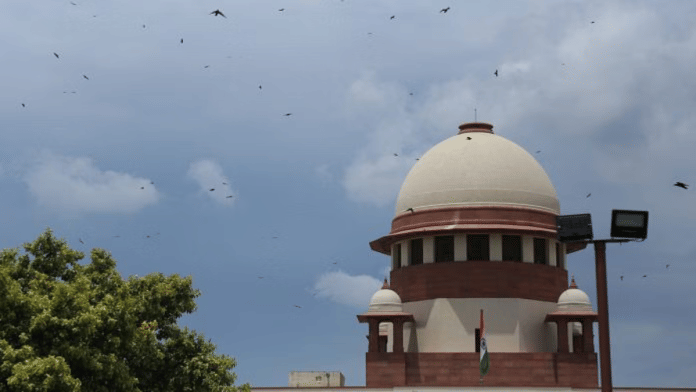New Delhi: A “heavy-handed” enforcement of competition regulations without studying their impact on market realities can discourage long-term capital and expertise the Indian economy urgently needs, hurting its growth as a global manufacturing hub, the Supreme Court has cautioned.
In a judgment delivered Tuesday, a bench of justices Vikram Nath and P.B. Varale observed that “prudence is vital” in “today’s global economic climate”.
Pointing out how the US and Europe have retreated behind “their newly minted trade walls of protectionist policies” to safeguard its homegrown market, the apex court backed India’s bid to emerge as a global centre for manufacturing, life sciences and technology.
However, it will succeed only if “rigid procedural compliance” is not insisted on in matters related to economic regulations, the court observed.
“Heavy-handed enforcement, divorced from market effects, would discourage the long-term capital and expertise the economy urgently needs,” the bench observed.
Advocating “effects-based standard”, the court said, it is a “strategic necessity if India is to capture the opportunities that more protectionist economies are in danger of forsaking.”
This approach will also prevent arbitrary restraint of lawful enterprise, it said.
The judgment was delivered on an 11-yr-old appeal filed by the Competition Commission of India (CCI) that challenged the 2 April, 2014, order of the Competition Appellate Tribunal (COMPAT) which had set aside the CCI’s finding that volume-based discounts offered by borosilicate glass tubing maker Schott India amounted to discriminatory pricing and abuse of the company’s dominant position in the market.
The bench observed the competition law, also called the anti-trust law, is “not designed to humble the successful or to clip the wings of enterprises that have, through industry and innovation, secured a commanding share of the market.”
Its true purpose, the court observed, is to preserve the process of competition. It is to ensure rivals may challenge the incumbent on merits, that consumers enjoy the fruits of efficiency, and that technological progress is not stifled by artificial barriers.
Also Read: Why SC quashed JSW’s Rs 19,700 cr insolvency resolution plan for Bhushan Power & Steel
The case
The case before the bench relates to a 2010 complaint filed by Kapoor Glass against Schott India. A principal domestic manufacturer of neutral USP-I borosilicate glass tubing, Schott India was accused of abusing its dominant position by offering exclusionary volume-based discounts, imposing discriminatory contractual terms and refusing supply on occasions.
Upon forming a prima facie opinion, the CCI director-general (investigation) inquired into the matter. In its report, the DG concluded that Schott India had violated section 4 of the 2002 Act, dealing with a company’s abuse of their dominant position.
Based on the report and after hearing both the parties, the CCI imposed Rs 5.66 crore as penalty, which was 4 percent of Schott India’s average three-year turnover. A cease-and-desist order was issued against the company, restraining it from any discriminatory practices.
On appeal by Schott India, the COMPAT set aside the penalty and held that the evidentiary material did not point to any abuse of the dominant position.
Affirming the COMPAT order, the SC said, “If mere size or success were treated as an offence, and every dominant firm exposed to sanction without tangible proof of competitive harm, the law would defeat itself: it would freeze capital formation, penalise productivity, and ultimately impoverish the very public it is meant to protect.”
India will succeed as a global centre for manufacturing, life sciences and technology “if regulation rewards scale, and intervenes solely when genuine competitive harm is shown”, the bench said.
Reflecting on the significance of the Competition Act 2002, the Supreme Court said, “India’s economic ascent rests on a delicate but decisive equilibrium. On the one hand, markets must remain contestable: no undertaking may extinguish rivalry by stratagems foreign to fair, merit-based competition. On the other hand, genuine achievement whether expressed in scale, efficiency or technological advance, must be rewarded and not punished, for it is the impetus for investment, innovation and consumer welfare.”
The 2002 law, it added, secures both the pledges, as it equips the CCI— the body authorised under the Act to penalise abuse of dominance—with wide-ranging powers of inquiry and remedy.
At the same time, the law permits intervention only where hard evidence shows that the impugned conduct has caused, or is likely to cause, proven harm, said the bench.
“Preserving this symmetry between discipline and encouragement is essential if the statute is to nurture robust rivalry while sustaining the confidence of domestic and global investors who increasingly view India as a premier destination for enterprise and innovation,” it added.
(Edited by Ajeet Tiwari)
Also Read: Competition watchdog creates incentives for whistleblower firms to give up information on cartels






